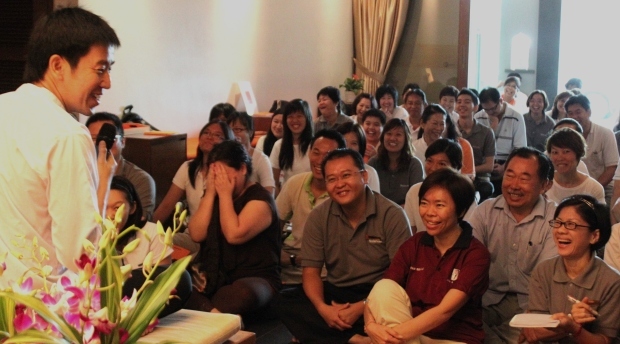Purifying through Perfections
Purifying through Perfections
The following are Bro. Tan’s teachings on 17 June 2012, the Fifth Gimhāna Sunday, summarised by Sis. Faith Teh.
Mettā, or loving-kindness, is defined as the wish for the happiness of all beings without exception. One feels this aura of goodwill and friendliness at Nalanda. During the past month, devotees new and old have been undertaking a deeper and more intensive Dhamma practice and self-discovery under the guidance of Bro. Tan. With an open mind and sincere heart, many came with the intention to learn and willingness to change. Indeed, some shared about how they have already begun to see positive differences in their daily lives. The blend of education and cultivation is bound to lead to transformation! Sadhu anumodana.
What we practise, we become good at. We are the inheritors of our own kamma. Even if we live alone on an island, isolated from the rest of the world, we could still be flooded by our defilements oozing out from within. We should make conscious effort to observe our habits and natural tendencies. If we have not internalised the Dhamma, when faced with an unexpected tense scenario, we find ourselves spontaneously reverting to old habitual patterns. Develop our ‘default response mode’ to be one that is steeped in wholesomeness instead. To overcome old habits, we supplant them with new, good ones. Chopping at the very roots, we gradually replace the old tree of defilements with new saplings of Pāramī (qualities for Perfection). In this way, we begin to transform ourselves.
According to the Cariyā Pitaka Commentary, Pāramī are those “virtues which are cultivated with compassion, guided by reason, uninfluenced by selfish motives, and untarnished by doubt or self-conceit.” The Ten Perfections are:
♦ Generosity (Dāna) ♦ Patience (Khanti)
♦ Morality (Sīla) ♦ Truthfulness (Sacca)
♦ Renunciation (Nekkhamma) ♦ Determination (Adhiṭṭhāna)
♦ Wisdom (Paññā) ♦ Loving-kindness (Mettā)
♦ Energy (Viriya) ♦ Equanimity (Upekkhā)
These are the qualities that purify and clarify our minds. Mettā and Upekkhā are also two of the Four Sublime States (Brahmavihāra), along with Compassion (Karuṇā) and Appreciative Joy (Muditā). As one establishes oneself in these boundless qualities, it becomes difficult for unwholesomeness to arise. Mettā cannot co-exist with anger, ill-will or hatred. Karuṇā is the antidote to cruelty and Muditā puts out the ambers of jealousy. Discerning rightly with Upekkhā, one is neither attached to the pleasurable nor aversive to the non-pleasurable.
Use every opportunity in our daily lives to cultivate ourselves in Pāramī. Whether we are reading the newspaper or stuck in a traffic jam, the choice of happiness (sukha) or suffering (dukkha) is in our own hands, or more accurately, in our minds. Persevere with discipline, devotion and determination. Victory will be ours!
Sunday, 1 July 2012 at 9am is Dhammacakka Day at Nalanda. Bro. Tan will be leading us in the recitation of the Dhammacakkappavattana Sutta as well as giving the teaching. We welcome all to come and join us! There is only one more Gimhāna Sunday remaining before the conclusion of this year’s Dhamma Retreat. Take this opportunity to come and learn how to apply the Buddha’s teachings in daily life!


